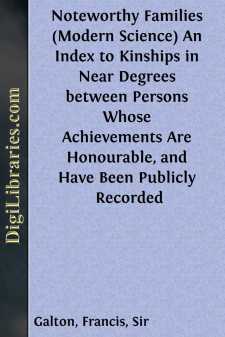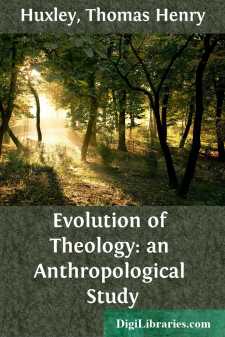Science
- Astronomy 18
- Biology 40
- Chemistry 13
- Electricity 1
- General
- History 6
- Light 1
- Paleontology 2
- Philosophy & Social Aspects 1
- Physics 3
- Relativity 2
- Study & Teaching 1
- Waves & Wave Mechanics 1
General Books
Sort by:
Gallick Reports: Or, A Collection of Criminal Cases adjudg'd in the Courts of Judicature in France. In which is Comprized, An Account of Arnold du Tilh, an Impostor, who deceived a Man's Wife and Relations, and puzzled, for a long Time, the Parliament of France. Memoirs of the famous Madam de Brinvilliers, who poisoned her Father, and two Brothers, and attempted the Life of her Sister,...
more...
by:
Francis Galton
Chapter I.—General Remarks. This volume is the first instalment of a work that admits of wide extension. Its object is to serve as an index to the achievements of those families which, having been exceptionally productive of noteworthy persons, seem especially suitable for biographical investigation. The facts that are given here are avowedly bald and imperfect; nevertheless, they lead to certain...
more...
WHAT IS EUGENICS? The wisest thing in the world is to cry out before you are hurt. It is no good to cry out after you are hurt; especially after you are mortally hurt. People talk about the impatience of the populace; but sound historians know that most tyrannies have been possible because men moved too late. It is often essential to resist a tyranny before it exists. It is no answer to say, with a...
more...
THE FORMATIVE PERIOD The best age at which to marry—Incompatibility of temperament—A happy marriage need not be a successful one—The evils of early marriage—The wedding night, its medical aspect—The honeymoon—When marital relations are painful—Times when marital relations should be suspended—The first weeks and months of wifehood—The formative period—A true marriage—A wife's...
more...
PREFACE A collection of about 2000 questions asked by children forms the foundation on which this book is built. Rather than decide what it is that children ought to know, or what knowledge could best be fitted into some educational theory, an attempt was made to find out what children want to know. The obvious way to discover this was to let them ask questions. The questions collected were asked by...
more...
Some thousands of years ago there was a city in Mesopotamia called Surippak. One night a strange dream came to a dweller therein, whose name, if rightly reported, was Hasisadra. The dream foretold the speedy coming of a great flood; and it warned Hasisadra to lose no time in building a ship, in which, when notice was given, he, his family and friends, with their domestic animals and a collection of...
more...
by:
Herbert Spencer
THE DEVELOPMENT HYPOTHESIS. [Originally published in The Leader, for March 20, 1852. Brief though it is, I place this essay before the rest, partly because with the exception of a similarly-brief essay on "Use and Beauty", it came first in order of time, but chiefly because it came first in order of thought, and struck the keynote of all that was to follow.] In a debate upon the development...
more...
Science JOHN MILNE BRAMWELL Hypnotism: Its History, Practice and Theory John Milne Bramwell was born in Perth, Scotland, May 11, 1852. The son of a physician, he studied medicine in Edinburgh, and after obtaining his degree of M.B., in 1873, he settled at Goole, Yorkshire. Fired by the unfinished work of Braid, Bernheim and Liébeault, he began, in 1889, a series of hypnotic researches, which, together...
more...
I conceive that the origin, the growth, the decline, and the fall of those speculations respecting the existence, the powers, and the dispositions of beings analogous to men, but more or less devoid of corporeal qualities, which may be broadly included under the head of theology, are phenomena the study of which legitimately falls within the province of the anthropologist. And it is purely as a...
more...
by:
Various
INTRODUCTORY NOTE Hippocrates, the celebrated Greek physician, was a contemporary of the historian Herodotus. He was born in the island of Cos between 470 and 460 B. C., and belonged to the family that claimed descent from the mythical AEsculapius, son of Apollo. There was already a long medical tradition in Greece before his day, and this he is supposed to have inherited chiefly through his...
more...











